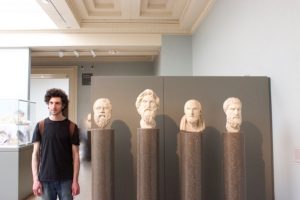What am I doing?

This blog is a work in progress… please feel free to look around, but watch out, you may find some silly jokes that I haven’t edited out!
What am I doing? Well, there could be countless replies to that question… for now I am simply trying to get used to blogging and figure out my inquiry question… yes, still, after all these months. I think that’s ok, I mean, I hope it is. I guess I should only be beginning, just like the phenomenologist tend to be, especially since I am just starting to teach.
Be patient toward all that is unsolved in your heart and try to love the questions themselves, like locked rooms and like books that are now written in a very foreign tongue. Do not now seek the answers, which cannot be given you because you would not be able to live them. And the point is, to live everything. Live the questions now. Perhaps you will then gradually, without noticing it, live along some distant day into the answer
-Rainer Maria Rilke (Letters to a Young Poet)
The concept I’m mostly working with is one I’ve been calling “hermeneutic listening”–what I mean to say by that is that when we try to understand others, who they are, what they want, what they’re really trying to say, and so on it involves an interpretation of what we hear (and see and smell etc.) from them. It’s only when we hear from them that we can talk. Consider how a class often starts–especially a high school class–especially after lunch: students walk in having lively conversations & the teacher has to stop all the conversations and have the students turn their attention to the lesson for the day. What I want to detail, mostly on a general and theoretical level for the time being, is what it means to for a student to be engaged in the classroom, to listen to their teacher and to other students in an immersive manner–just the way students listen to their friends when they were having a lively discussion as they were walking into the classroom. My question is about provoking that kind of engagement in students where room is opened up for freedom in conversation, for playfulness in thinking, and for each student to be able to find the classroom material that is studied in common by the class, relevant to their experience.
Another term, that I wish to be a future part of my study in “complementarity”. Even Aristotle admitted that he didn’t know everything! Sometimes we compare ourselves with others in doing the exact same task but most of life’s tasks have us working together, each with their own strengths. With academic journals, peers review works each contributing something the other may not have thought of or noticed; in a team sport a star player can’t win on their own–the best captains are the ones who get the most out of the group; George Lukas was credited for creating Star Wars but we often forget how essential so many people were in projects like that one–his additions a couple decades later to the initial trilogy were so tasteless as to prove it couldn’t have been on his convictions alone that the success of these great movies rested. Yet, when it comes to grading and assessment we can’t help but rank on a number scale. We’ve all seen as well as been students who work well together with others and achieve great results and I’d like to look at how we complement each other to achieve that kind of result.
So far this is mostly a project of articulation, about things I see happening, as a kind of starting point to putting together some kind of philosophy of education.